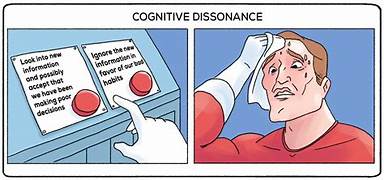Stuck in Cognitive Dissonance

I know, it’s awful early on a Monday morning to be dropping emotion-state describing terms from the field of Psychology. But oh well, “I just can’t shake this feeling” (unintentionally stealing the lyrics from countless songs over the years)! Cognitive Dissonance, which the simplest definition from Psychology Today defines as the state of discomfort felt when two or more modes of thought contradict each other, seems to be the closest to a single label that I can find to explain how I feel. Perhaps an even more direct way to describe my mental state is my stock answer when asked “How are things?”…” Things are good, but I’m not.” Of course, I rarely share with this level of brutal honesty to avoid being a downer or have to explain my seemingly incongruent frame of mind. I’m consoled a bit by the sheer amount of content written about Cognitive Dissonance as for the evidence it provides that I’m not alone in my experience. It’s not lost on me that “Acceptance is the Answer” here too, in that it is not the discomfort that is problematic, but the actions and beliefs it may cause. After all, emotional or cognitive discomfort need not be addressed by a physical response like pulling back from a hot flame or resting a pulled muscle.
Interestingly; that I was relatively happy, free of depression, or self-destructive tendencies for over a year in the immediate aftermath of my crash and TBI, highlights a seemingly non sensical reality that I’ve experienced. Whether it was an inability to understand my situation, psychologically protective denial, or just complete present and mindful living (for which I can’t take credit), despite the intense circumstances of early recovery, life was good. Don’t get me wrong whatever the reason for my seemingly irrational exuberance for life, I’m immensely grateful that mindset put me in a place where I could focus on my time in neuro rehab without that nagging feeling of unworthiness creeping in. Perhaps it was the revelation that I had caused my injuries or growing understanding of their permeance, but that “pink cloud” didn’t last.
So having made such incredible progress developing my cognitive and physical abilities in the more than 18 years since the injury, building a new life with amazing support, and regaining sobriety, everything must be roses right? Unfortunately not, and therein lies the Cognitive Dissonance. I’ll refrain from itemizing all the blessings in my life that I can only credit to Grace with a capital G indicating their origin, but let’s just say these gifts take my breath away which leaves me even more frustrated in accepting my unease.
Along with the aforementioned Psychology Today definition of Cognitive Dissonance, included was the statement that “the response to it may range from ignoring the source of it to changing one’s beliefs or behavior to eliminate the conflict.” So the feeling itself isn’t problematic, but the changed belief(s) and any maladaptive behavior that result is. While I wish it were the case that the unease I’ve felt motivated altruistic behavior or even made me rethink my feelings of unworthiness; unfortunately, that self-sabotage and guilt require neither hard work or discipline has made the them my default.
As the story about 5 frogs sitting on Lily pads who decide to jump off ends by asking how many are left on a pad, later revealing that all of them remain in place because none of them took action and jumped, change takes action. So what’s lesson derived from the tale of the frogs? That all 5 remain because while they all only made a decision, highlighting that change takes action. While the catchy frog tale seems to minimize the importance of a decision, it strikes me that almost all positive change begins with the decision. Although I don’t like to make New Years resolutions, perhaps starting the year with a decision will spawn positive change: I don’t know what I deserve or how I should feel, however, certainly any discomfort I feel doesn’t warrant self-sabotaging behavior to dampen Graceful gifts.